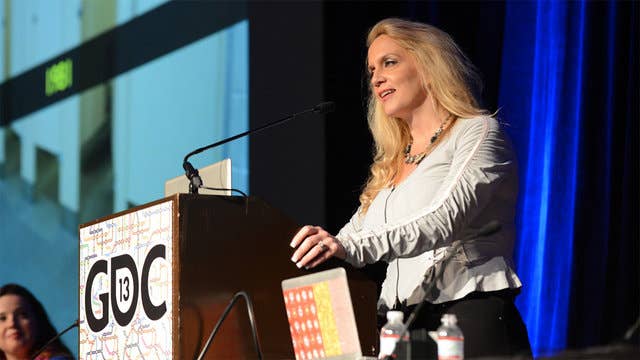Dancing girls and industry evolution
Arguments over how the industry treats women are a good thing - they show how far we've come, as well as how much remains to be done
If you ever feel depressed about how this industry is performing in terms of gender representation and treatment of minorities - and god knows there are plenty of reasons to feel depressed about that particular subject - then this year's GDC has been a very interesting event to watch. It's not the most commercial or high-profile event the industry has to offer, and for that very reason, it's the beating heart of the industry's social calendar - the place that people go to talk about the creativity, business and culture of games, both in the official sessions and (perhaps more importantly) in bars and parties in the evenings.
This year, the question of how the industry deals with women was firmly on the agenda. It was present in a number of sessions, but it was more obvious in the evenings - and even more obvious in the mornings, when hung-over attendees awoke to find storms raging over the once de-rigeur decision to include scantily clad dancing ladies at parties for developers. The IGDA even saw a couple of resignations over their failure to block this practice for a second year running at their GDC party.
"At GDC, genuine problems were called out in the open, and far from being dismissed, those calls were widely supported. We're getting there"
A lot of people were quite upset by this - which I actually find rather heartening. In fact, the overall tone of GDC in terms of the industry's slow and painful process of growing up was extremely positive. The first step towards addressing problems is to admit the existence of problems - and at GDC, genuine problems were called out in the open, and far from being dismissed, those calls were widely supported. We're getting there.
It's worth talking briefly about why the issue of dancing girls is actually an important one, because it's something that many of us simply don't understand. I'm perfectly comfortable with dancing girls, and I expect that most of you are too - no matter what your gender or sexuality may be. However, not everyone is. Some women find the sexualisation of the environment through the presence of dancing girls deeply uncomfortable, even threatening; some men equally find it disturbing and unpleasant. As such, it becomes a question of context. If I hire dancing girls for my party (unlikely, but more unlikely things have happened), well, it's my party - you don't have to come. The IGDA's party, however, is for IGDA members - for game developers - for the whole lot of them, including plenty of people who aren't comfortable with dancing girls being imposed on what's meant to be a mostly professional networking event.
This is where the changes in the industry over the past few years are really becoming evident. Dancing girls (and worse) have been part and parcel of what passes for after- hours entertainment in this business for decades. Plenty of the entertainment that publishers have laid on has focused exclusively on a disparagingly adolescent view of their business associates (in the press and elsewhere); plenty of game launches, in particular, have been an exercise in awkwardness as the industry's small but growing band of female, gay or simply happily married types look unhappily at the floor or ceiling while their compatriots leer at an underdressed young woman sliding around a pole.

Yet for all those decades, hardly anyone said anything - because the reality was that the industry was almost entirely made up of young, straight, unattached males, and there was no hope of making any headway with the suggestion that considering other people might be a good idea. Here we are, though, the week after GDC, and we're actually having the discussion. Inclusiveness isn't happening, entirely, but it's being talked about, and that's perhaps the most important step on the way.
Not all of the discussions are going well. Even here on GamesIndustry International, where the comments threads are usually interesting and thoughtful, discussion of the industry's treatment of females and minorities can bring out unpleasantly backwards and small-minded views from a small number of commenters. On the wider web, plenty of misogynists with no skin in this game but an eternal axe to grind with women took this as another cue to set forums and threads alight with unpleasant and often downright nasty responses. It wouldn't be hard to look at those threads and think the wrong side is winning - but it would be incorrect. The vehemence and rudeness of the backlash is, if anything, a testament to how utterly the backwards, sniggering, adolescent industry of old is being changed by an influx of new blood that's not prepared to kowtow to such attitudes - not to mention by plenty of "old blood" veterans who aren't prepared to be shushed any more.
Talk to people around the industry, and it's clear where the wind is blowing. If this medium is to have a future, it needs to appeal to everyone - to all genders, all ethnicities, all orientations - and doing that doesn't just mean creating products that appeal, it means creating an industry that appeals. It means being able to attract the best and brightest no matter what configuration of genitals, skin colour and sexual attraction they may employ. We've been terrible at that for altogether too long, allowing ludicrous and discredited arguments to stand in the way of progress - now, finally, we're starting to roll back the institutional biases which were thinly veiled by mealy-mouthed lies about women being disinterested in working on games, and so on. Open criticism of dancing girls at an industry party may only be a small step on the way, but the longest marches are made up of small individual steps, and this one speaks to a wider confrontation of industry values that have excluded huge swathes of the population from participating.
"Finally, we're starting to roll back the institutional biases which were thinly veiled by mealy-mouthed lies about women being disinterested in working on games"
We're not there yet, of course - don't pop open any corks. At heart, the games industry is still male-dominated both in its employment statistics and in its assumed consumer. We still don't have the confidence to launch very many games with female lead characters; we routinely turn out products where women are presented as little more than adolescent sexual fantasies wrapped up in a bunch of poorly-clad polygons. Loads of girls play games - they always have, and now they do so more than ever - but few game developers seem to be able to create something that genuinely speaks to an audience that isn't straight and male, or that inspires such a person to think of games as a creative medium where they could bring their expression to life.
That's what we need to do, if the medium is to evolve into something more than a cavalcade of man-shooting and car-driving. GDC this year, in this light, was a seriously positive event. Sometimes it's worth stepping back from the heat of today's arguments and considering, for a moment, how much worse things were back when there simply wasn't any argument at all.

